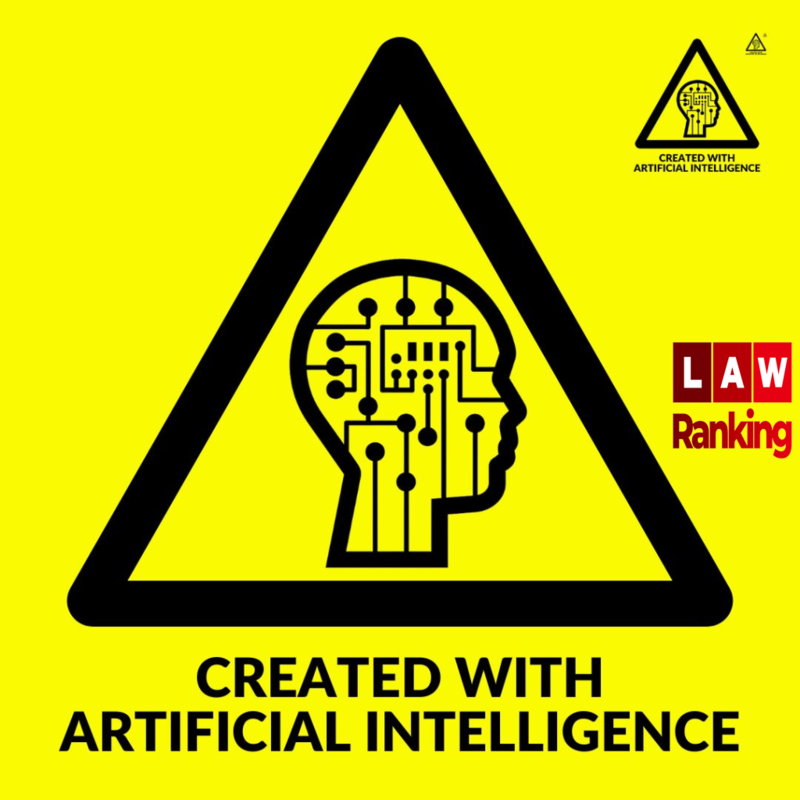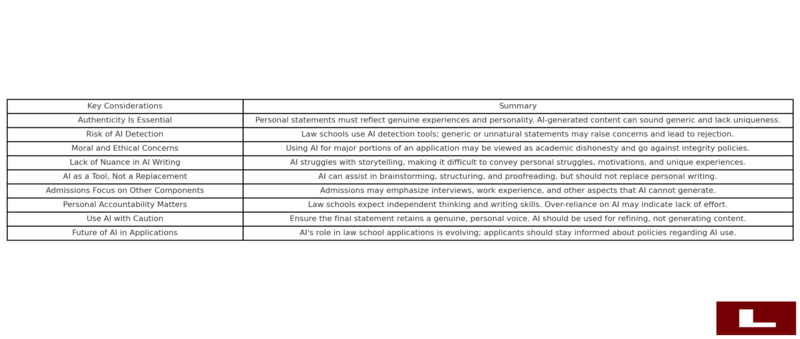How To Use AI To Boost Your LL.M. Personal Statement
Input
Modified
Harness the power of AI to elevate your LL.M. personal statement! Tools like ChatGPT enhance language, generate ideas, and refine grammar, but they should never replace your unique voice and personal experiences. Relying solely on AI creates a generic, impersonal statement that fails to showcase what makes you stand out. Thus, prospective LL.M. students should exercise caution while using ChatGPT and other AI technologies to create their personal statements. Although these tools can be very helpful for improving language, coming up with ideas, or proofreading grammar, they shouldn't be used only to write the personal statement. This guide explains how to use AI effectively while avoiding common pitfalls, ensuring your application remains authentic and compelling.
Authenticity Is Essential
A candidate's distinct personality, experiences, and motivations are intended to be reflected in their personal statement. Beyond an applicant's grades, admissions staff want to know more about them. A lack of authenticity may result from writing the personal statement with artificial intelligence (AI) or from heavily altering it. Personal statements need to reflect genuine personality, experiences, and motivations. AI-generated content can sound generic or overly formal, losing the personal touch that admissions committees value in showcasing a candidate's true character and individuality.Presenting the statement in your own voice, which AI cannot imitate, is essential.
Possibility of detection
A personal statement that seems too general or lacking specifics may arouse suspicions because many admissions committees have methods to identify AI-generated content. Schools place a high value on authenticity and may reject AI-assisted content because of their unfavorable perception. Many law schools use tools to detect AI-generated content. A personal statement that lacks personal detail or sounds unnatural may raise red flags, potentially leading to suspicion of dishonesty or even rejection. The statement is weakened by an over-reliance on AI. Over-reliance on AI can deprive the personal statement of its uniqueness, even though it can assist with grammar checks, language improvement, and structural recommendations. Admissions committees prefer to see firsthand accounts and concrete instances that demonstrate the applicant's genuine beliefs, experiences, and driving forces. This richness is frequently absent from AI-generated text, which sounds more formal or general. Relying too heavily on AI can lead to a statement that lacks depth and nuance. Admissions teams are looking for detailed, reflective insights that showcase the applicant's specific experiences, goals, and motivations—qualities AI cannot fully capture.

Moral Issues
Since using AI to write large portions of application essays may be viewed as dishonest or similar to cheating, many educational institutions and application platforms advise against doing so. For example, content produced by AI might not adhere to the institution's standards for academic integrity. Using AI to generate significant portions of a personal statement may be seen as academic dishonesty or cheating. Many law schools explicitly discourage or prohibit AI use in application essays, as they want applicants to demonstrate their own critical thinking and writing abilities. Absence of Nuance Although AI tools can help with idea generation and language improvement, they frequently fall short when it comes to complex storytelling. AI cannot adequately handle a personal statement, which should thoughtfully and personally address your unique background, goals, and any potential shortcomings (such as poor grades or gaps in experience).AI tools may fail to capture subtle details or personal stories that would highlight why the applicant is suited for law school. Sensitive topics, such as explaining gaps in experience or addressing low grades, require a personal touch that AI cannot effectively provide. AI tools tend to produce generic, trite, or impersonal writing. Personal statements should stand out by offering unique, specific examples that showcase why the applicant is the right fit for the program. AI-generated content often lacks the creativity and personal connection necessary for an impactful statement. Additional Clarification Your Story in Your Statement: Candidates can discuss their goals, reasons for wanting to pursue an LL.M., and what makes them a special fit for the program in their personal statement. AI is unable to replicate your unique experiences, struggles, and victories. AI may propose general concepts like "justice" or "making a difference," for example, but it is unable to recount the details of a volunteer experience or a pivotal event in your life that led you to pursue a legal education. Telling these tales will help you stand out from the competition.
AI as a Tool, Not a Crutch
In certain situations, AI can be applied morally and successfully. For instance: Brainstorming: It can help you come up with concepts for possible experiences or themes. Structure: AI can offer suggestions on how to organize your statement, ensuring clarity and flow. Proofreading: It can assist in detecting grammar mistakes or helping with wording, but it should never replace your personal writing. Personal Accountability: Law schools expect applicants to submit work that accurately represents their thoughts and writing abilities. If an applicant is too reliant on AI, it risks showing a lack of personal accountability and effort, which might be seen as concerning when entering a rigorous academic environment like an LL.M. program. In Summary: Using AI tools like ChatGPT to assist in writing a personal statement can be valuable, but it should not replace the core of your application. Ensure that the voice, story, and content reflect your personal experiences and goals. AI can help fine-tune your writing, but the heart of the statement—your authentic narrative—must come from you.
Future Trends and Predictions Emphasis on Other Application Components
As AI-generated content becomes more prevalent, admissions offices may place greater emphasis on aspects of the application that are harder to replicate with AI, such as interviews, professional experience, and the cohesion of the applicant's overall story. This could lead to a shift in how applications are evaluated, with more focus on a candidate's lived experiences and less on the content of written statements alone. Ongoing Debate: The debate over AI's role in law school applications is far from settled. Some schools may revise their policies in the coming years, while others may continue to experiment with different approaches. As technology evolves, we can expect more nuanced and detailed guidelines from admissions offices in the future. How Applicants Should Proceed: Carefully Review Application Instructions: Given the variability in AI policies, applicants should carefully read the instructions for each law school they apply to, paying particular attention to AI usage clauses.
Draft an Organic Personal Statement
It remains wise to draft a genuine, human-written personal statement first. Even if AI is permitted, it’s still possible that using AI could make the statement less compelling. In many cases, AI assistance might only be helpful in editing an existing draft rather than generating an entirely new statement.

Use AI with Caution
If AI tools are used, applicants must ensure that their final statement retains a unique, authentic voice. AI should only be used as an editing tool, not as a substitute for genuine self-reflection and storytelling. In conclusion, the role of AI in law school applications is an evolving issue. Applicants should stay informed about the policies of individual schools and strive to maintain authenticity and integrity in their application materials, regardless of how AI is used.

